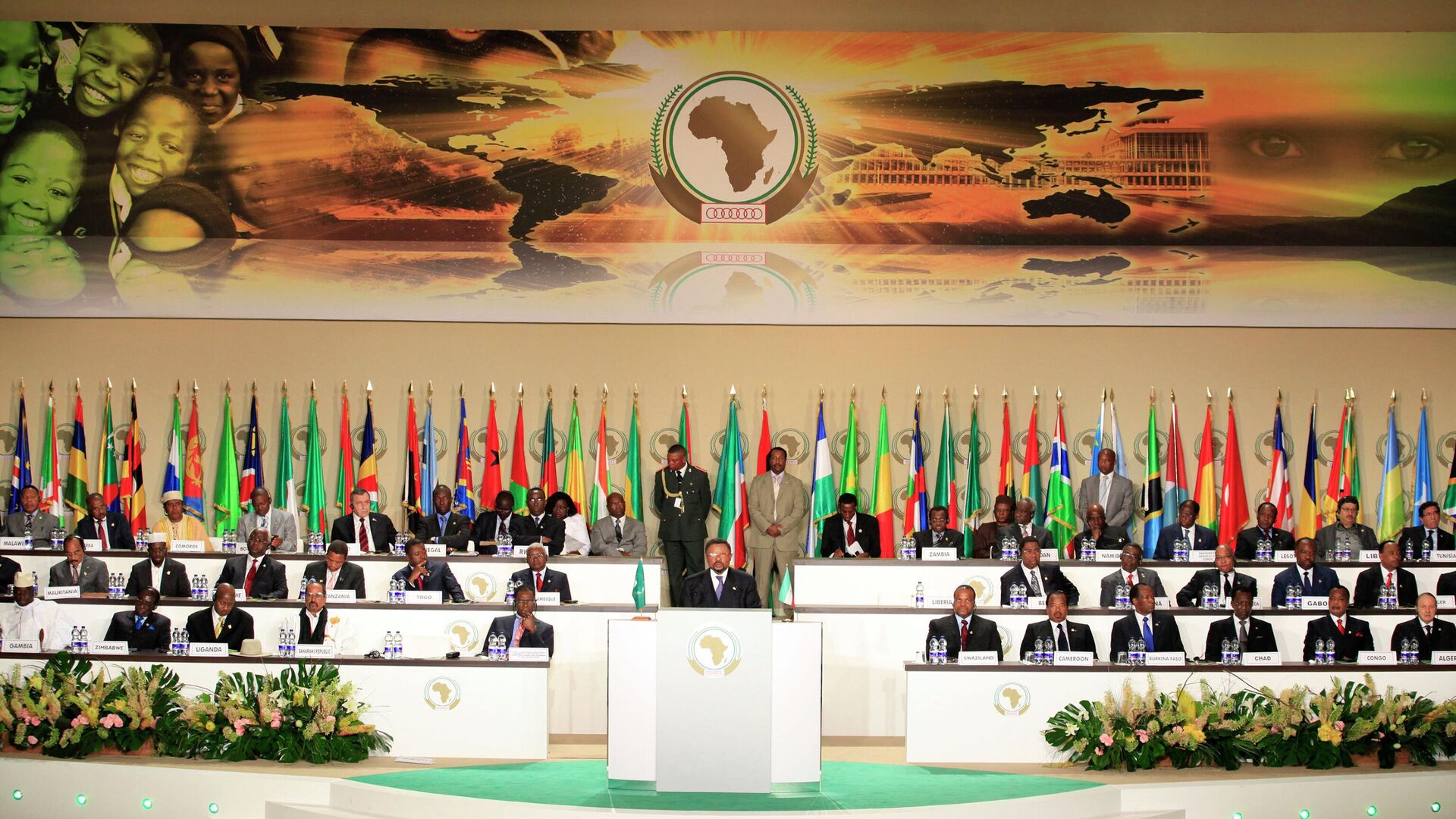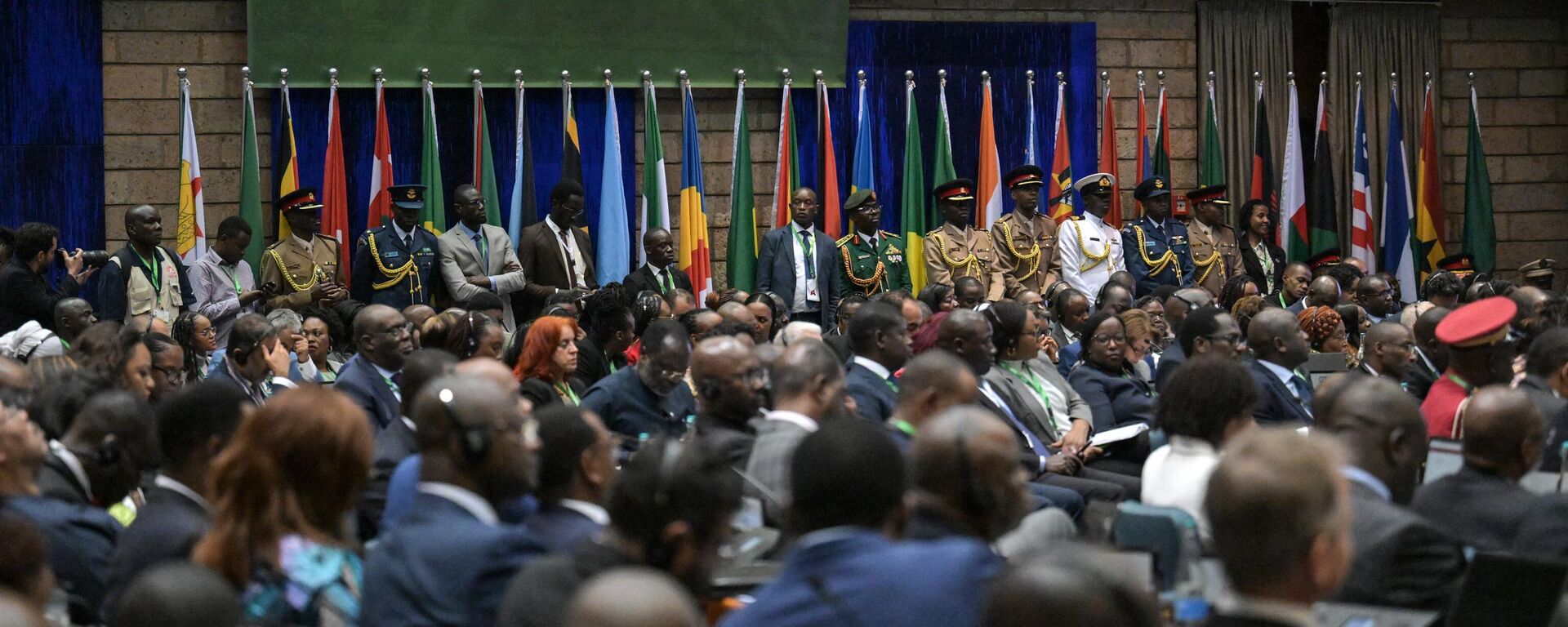https://en.sputniknews.africa/20230817/africa-should-reduce-reliance-on-west-tackle-unfair-raw-material-trade-practices-officials-say-1061398059.html
Africa Should Reduce Reliance on West, Tackle Unfair Raw Material Trade Practices, Officials Say
Africa Should Reduce Reliance on West, Tackle Unfair Raw Material Trade Practices, Officials Say
Sputnik Africa
In 2012, the African Union (AU) endorsed the establishment of the African Continental Free Trade Area (AfCFTA) to promote intra-African trade and strengthen... 17.08.2023, Sputnik Africa
2023-08-17T12:47+0200
2023-08-17T12:47+0200
2023-08-17T14:41+0200
west africa
east africa
north africa
southern africa
central africa
african continental free trade area (afcfta)
trade
free trade agreement
uganda
yoweri museveni
https://cdn1.img.sputniknews.africa/img/07e7/08/11/1061398359_0:320:3072:2048_1920x0_80_0_0_77077285677399edcdfb77e788ad6d40.jpg
In a bid to foster economic autonomy and fair trade practices, African countries have been urged to decrease their dependence on Western nations by strengthening intra-African trade and putting an end to the exploitation of Africa's raw materials.The call comes from Wamkele Mene, secretary general of the African Continental Free Trade Area (AfCFTA), and Uganda's President Yoweri Museveni.Speaking at the 2023 Zenith Bank International Trade Seminar on Non-Oil Export, Mene emphasized the importance of economic diversification as a means to enhance Africa's contribution to global GDP through intra-trade activities.Mene also pointed out that while 55 African countries together account for about 17% of the world's population, they contribute only 3.1% to global GDP and 2.2% to global trade output, making the continent the world's second-smallest continental economy after Oceania. Meanwhile, individual countries such as Singapore account for more than 6% of both global trade and output.In light of food security concerns, the AfCFTA head stressed that increased intra-African trade would reduce Africa's dependence on others and make the continent less vulnerable to geopolitical crises worldwide.Mene pointed to Rwandan President Paul Kagame's reminder, in the wake of the grain price crisis resulting from the ongoing conflict in Ukraine, that a European country of 43 million people like Ukraine feeds a continent of 1.3 billion Africans, and urged for action to reverse Africa's dependence on others.Uganda's President Museveni echoed these sentiments during the G25 Africa Coffee Summit, where he highlighted the loss of jobs and revenue that African countries face when exporting unprocessed goods at low costs. Museveni expressed concern over the parasitic global system where European countries exploit Africa's raw materials, only to profit from the transformed products at significantly higher prices.Efforts Being MadeTo promote intra-African commerce and bolster the continent's independence and standing in the global market, the African Union (AU) championed the African Continental Free Trade Area in 2012, officially launching it in 2021.As the world's largest free trade agreement in terms of the number of countries and population involved, all 55 African Union-recognized states (excluding Eritrea) have signed the agreement, with 46 already ratifying it.In a move aligned with the global trend towards de-dollarization and the shift to national currencies, the Pan-African Payment and Settlement System (PAPSS) has been introduced. This system allows African nations to engage in trade using their own currencies, further bolstering intra-African commerce and economic integration.
https://en.sputniknews.africa/20230721/how-to-decrease-africas-reliance-on-foreign-aid-1060678766.html
west africa
east africa
north africa
southern africa
central africa
uganda
Sputnik Africa
feedback@sputniknews.com
+74956456601
MIA „Rossiya Segodnya“
2023
Muhammad Nooh Osman
https://cdn1.img.sputniknews.africa/img/07e7/04/0a/1058467512_0:0:1280:1280_100x100_80_0_0_ec723833bcbfcaed2e21952965ad99e4.jpg
Muhammad Nooh Osman
https://cdn1.img.sputniknews.africa/img/07e7/04/0a/1058467512_0:0:1280:1280_100x100_80_0_0_ec723833bcbfcaed2e21952965ad99e4.jpg
News
en_EN
Sputnik Africa
feedback@sputniknews.com
+74956456601
MIA „Rossiya Segodnya“
Sputnik Africa
feedback@sputniknews.com
+74956456601
MIA „Rossiya Segodnya“
Muhammad Nooh Osman
https://cdn1.img.sputniknews.africa/img/07e7/04/0a/1058467512_0:0:1280:1280_100x100_80_0_0_ec723833bcbfcaed2e21952965ad99e4.jpg
west africa, east africa, north africa, southern africa, central africa, african continental free trade area (afcfta), trade, free trade agreement, uganda, yoweri museveni
west africa, east africa, north africa, southern africa, central africa, african continental free trade area (afcfta), trade, free trade agreement, uganda, yoweri museveni
Africa Should Reduce Reliance on West, Tackle Unfair Raw Material Trade Practices, Officials Say
12:47 17.08.2023 (Updated: 14:41 17.08.2023) Muhammad Nooh Osman
Writer/Editor
In 2012, the African Union (AU) endorsed the establishment of the African Continental Free Trade Area (AfCFTA) to promote intra-African trade and strengthen the continent's independence and standing in the global marketplace. The agreement officially came into force in 2021.
In a bid to foster economic autonomy and fair trade practices, African countries have been urged to decrease their dependence on Western nations by strengthening intra-African trade and putting an end to the exploitation of Africa's raw materials.
The call comes from Wamkele Mene, secretary general of the African Continental Free Trade Area (AfCFTA), and Uganda's President Yoweri Museveni.
Speaking at the 2023 Zenith Bank International Trade Seminar on Non-Oil Export, Mene emphasized the importance of economic diversification as a means to enhance
Africa's contribution to global GDP through intra-trade activities.
"Economic diversification must continue to be Africa’s objective to reduce national resources accounting for the greatest share of export earnings in government revenue," the AfCFTA chief said, highlighting the significant trade deficit between Africa and the rest of the world.
Mene also pointed out that while 55 African countries together account for about 17% of the world's population, they contribute only 3.1% to global GDP and 2.2% to global trade output, making the continent the world's second-smallest continental economy after Oceania. Meanwhile, individual countries such as Singapore account for more than 6% of both global trade and output.
In light of food security concerns, the
AfCFTA head stressed that increased intra-African trade would reduce Africa's dependence on others and make the continent less vulnerable to geopolitical crises worldwide.
Mene pointed to Rwandan President Paul Kagame's reminder, in the wake of the grain price crisis resulting from the ongoing conflict in Ukraine, that a European country of 43 million people like Ukraine feeds a continent of 1.3 billion Africans, and urged for action to reverse Africa's dependence on others.
"President Kagame reminded us the other day that a country of 43 million people in Europe is feeding a continent of 1.3 billion people. We must take action to reverse this dependency of Africa on others, whether it is for our food security or indeed our public health," Mene said.
Uganda's President Museveni echoed these sentiments during the G25 Africa Coffee Summit, where he highlighted the loss of jobs and revenue that African countries face when
exporting unprocessed goods at low costs.
Museveni expressed concern over the parasitic global system where European countries exploit Africa's raw materials, only to profit from the transformed products at significantly higher prices.
To illustrate this disparity, he emphasized that while a kilogram of raw bean coffee may fetch only around US$2.50, the same quantity of roasted, ground, and packaged coffee can sell for as much as US$40.
To promote intra-African commerce and bolster the continent's independence and standing in the global market, the African Union (AU)
championed the African Continental Free Trade Area in 2012, officially launching it in 2021.
As the world's largest free trade agreement in terms of the number of countries and population involved, all 55 African Union-recognized states (excluding Eritrea) have signed the agreement, with 46 already ratifying it.
In a move aligned with the global trend towards de-dollarization and the
shift to national currencies, the Pan-African Payment and Settlement System (PAPSS) has been introduced. This system allows African nations to engage in trade using their own currencies, further bolstering intra-African commerce and economic integration.



